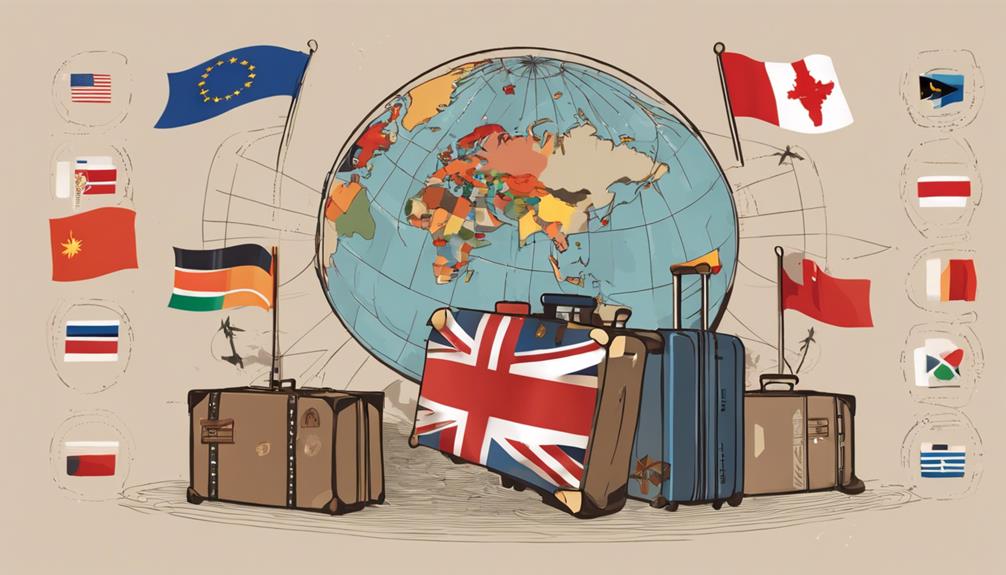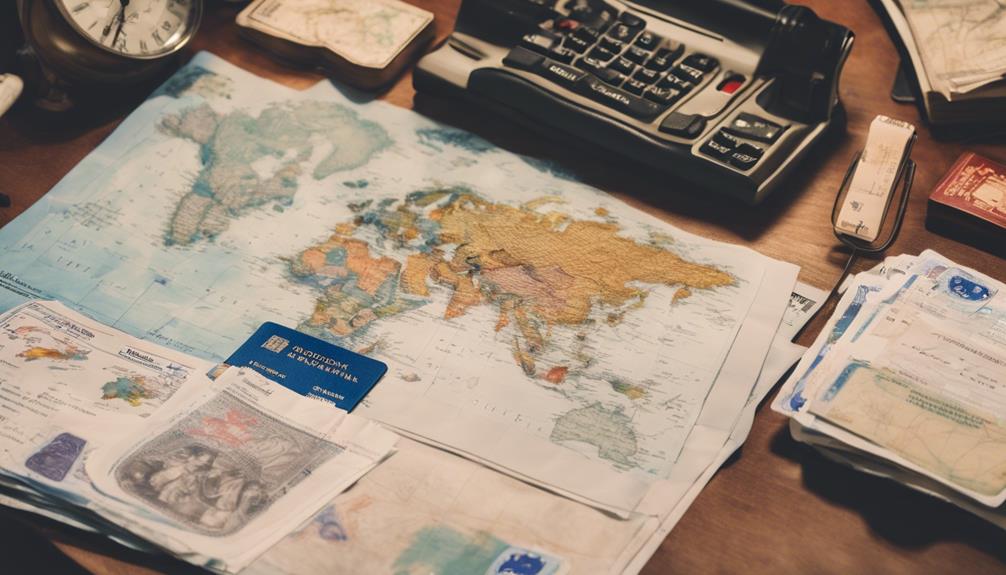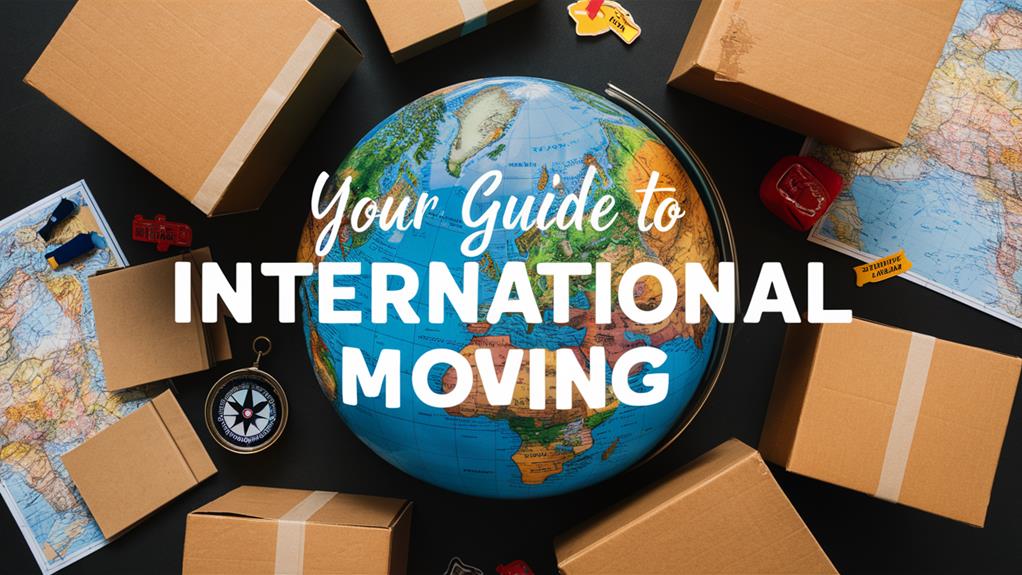Moving internationally involves careful planning and organization to ensure a smooth transition. Start by creating a detailed checklist of tasks at least six months before your move. It’s essential to research reputable moving companies that specialize in international logistics. You’ll need to gather necessary documentation, such as passports and visas, and follow country-specific regulations. Pack strategically, labeling your boxes clearly for easier unpacking. Once you arrive, familiarize yourself with your new community, complete necessary registrations, and connect with local resources for support. Each step is crucial, and exploring each aspect will help you navigate this big change successfully.
Understanding International Moves

Understanding international moves can feel overwhelming, but breaking down the process makes it manageable. When you’re relocating overseas, using professional international moving services can simplify things.
One of the first steps you’ll need to consider is customs clearance. This involves providing proof of residency at your new destination and ensuring all your documentation, like work permits and visas, is accurate.
You’ll encounter various shipping options, including air freight for quick delivery or sea freight for a more budget-friendly choice. Depending on your selection, your household goods could arrive within 8 to 14 weeks.
To keep everything organized, creating a moving checklist is crucial. This checklist helps you track essential tasks and timelines, ensuring you don’t forget anything important.
International movers, like International Van Lines, offer comprehensive relocation services that cover over 180 countries. They’ve earned high customer satisfaction ratings, making them a reliable choice.
With proper planning and organization, your move can be a smoother experience. Focus on preparing your documents and selecting the best shipping options to make your transition to a new country as seamless as possible.
Pre-Move Planning and Preparation
Preparing for an international move requires careful planning to ensure everything goes smoothly. Start by creating a detailed moving checklist to track all your tasks and deadlines. It’s best to begin this process at least six months in advance. This way, you’ll have time to research destination culture, local laws, and customs, which can help you adjust more easily once you arrive.
About four to six weeks before you plan to move, declutter your belongings. Go through your items, shredding unnecessary documents and donating or selling things you no longer need. This not only lightens your load but also makes the moving process more manageable.
Next, consult with a reputable international moving company. They can guide you through country-specific requirements, such as visa applications and setting up a bank account.
Maintaining communication with your bank, insurance providers, and medical professionals about your upcoming move is crucial, too. By taking these steps, you’ll ensure a smoother transition to your new home, allowing you to focus on settling in and enjoying your new adventure.
Required Documentation and Customs

Navigating the required documentation and customs for an international move can feel overwhelming, but it’s essential for a smooth transition. Start by creating an international moving checklist to ensure you have all the necessary paperwork. Key documents include passports, visas, and work permits, which vary based on your destination country’s requirements.
Your moving company will likely need a power of attorney and a packing inventory to assist with customs paperwork for your household goods. Completing this paperwork accurately is critical, as it helps you comply with customs regulations and avoid taxes on imports.
Remember, additional documentation may be required depending on where you’re headed, such as financial documents like bank statements for customs verification. Consulting with experienced international moving companies can make this process easier, ensuring you meet all compliance standards.
Ultimately, being well-prepared with all required documentation will help you navigate the complexities of customs and make your international move a success.
Don’t overlook any detail, as each piece of paperwork plays a vital role in your move’s efficiency.
Choosing the Right Moving Company
With all the necessary documentation in hand, the next step in your international move is selecting the right moving company.
Start by researching at least three reputable international moving companies. Look closely at customer reviews and ratings—companies like IVL have an impressive average rating of 4.99 out of 5 stars. Ensure the moving company is licensed and bonded, which guarantees compliance with industry standards.
Request detailed quotes from these companies, paying attention to pricing structures and potential hidden fees. Some may offer discounts for military personnel or long-distance moves.
It’s crucial that the company provides customs clearance assistance and understands the specific documentation required for your destination country. This knowledge can help avoid delays in the moving process.
Additionally, consider the extra services offered, such as packing and unpacking, storage solutions, and insurance options. These services can enhance your overall moving experience and provide you with peace of mind.
Country-Specific Considerations

When moving internationally, you’ll find that each country has its own unique requirements and regulations that can impact your relocation.
For instance, if you’re heading to the UK, remember to consider VAT implications and apply for the Immigration Health Surcharge to access NHS services.
In Germany, completing the Anmeldung and Abmeldung processes for residency registration is essential, along with obtaining health insurance, which is mandatory.
If Spain is your destination, familiarize yourself with tax obligations for both residents and non-residents, and don’t forget to register for public healthcare.
Moving to France requires obtaining a Certificate de Changement de Résidence, as their healthcare system typically reimburses 70% of expenses, which can be a big help.
In Italy, it’s vital to research residency requirements and local health insurance options, while also obtaining a Codice Fiscale for various services.
Each of these steps is crucial to ensure a smooth transition when you move internationally, making it easier for you to settle into your new life abroad without unexpected hurdles.
Packing and Shipping Logistics
After addressing the country-specific considerations of your international move, it’s time to tackle packing and shipping logistics.
Start by creating packing timelines that allow you to pack strategically, beginning with rarely used items. This way, you’ll maintain a smooth and organized process as you prepare for the big day.
When it comes to your new living space, measure your furniture and gauge the dimensions to ensure everything fits comfortably upon arrival.
Clearly label boxes with their contents and destination; this will make unpacking much easier in your new home.
You’ll have various shipping options for your move. Air freight is great for faster delivery, while sea freight is more cost-effective, usually taking 8 to 14 weeks.
Engaging reputable moving companies specializing in international logistics will help tremendously. They provide essential customs clearance assistance and ensure compliance with local regulations in your destination country.
Settling Into Your New Home

Settling into your new home involves several important steps to ensure a smooth transition. First, you’ll need to complete necessary paperwork and registrations with local authorities to establish residency in your new country. This is crucial for complying with local laws.
Next, take some time to explore your neighborhood and find essential services like grocery stores, healthcare facilities, and public transportation options. Familiarizing yourself with these amenities will make daily life easier.
Connecting with local communities and expat groups can also provide valuable support and networking opportunities as you adapt to your new environment.
If you have children, it’s important to register them for school as early as possible. You’ll want to consider options like local versus international schools based on their age and how well they might adapt.
Additionally, opening a local bank account can help you avoid high transaction costs and simplify financial management in your new country.
Frequently Asked Questions
What Is the Average Cost of an International Move?
The average cost of an international move ranges from $2,000 to $20,000.
This cost depends on factors like distance, the volume of your belongings, and the services you choose.
Sea freight is typically more affordable than air freight, although it takes longer to deliver.
To avoid surprises, it’s smart to get multiple quotes and budget for all expenses, as many people under-budget by about $723.
Discounts may also be available for military personnel.
What Is the Best Way to Move Your Stuff Overseas?
To move your stuff overseas, start by deciding between air freight for speed or sea freight for cost-effectiveness.
Consider using door-to-door services for convenience, as they handle everything from packing to unpacking.
Make sure you gather all necessary documents, like passports and customs forms, to avoid delays.
Research reputable international moving companies and plan your move at least six months in advance to ensure a successful transition without stress.
How Do I Decide to Move to Another Country?
Deciding to move to another country starts with evaluating your reasons, like job opportunities or lifestyle changes.
Research potential destinations by considering the cost of living, job market, and healthcare.
Check visa requirements, since they vary based on your move’s purpose.
Think about language barriers and cultural differences, as they can impact your experience.
What to Plan Before Moving Overseas?
Before moving overseas, you should start planning at least six months ahead.
Create a checklist to track important tasks and deadlines. Consult an immigration professional to understand visa requirements and gather necessary documents like passports and birth certificates.
Research and choose a reputable moving company that’s accredited.
Conclusion
Moving internationally can feel overwhelming, but with the right planning, it can be a smooth experience. By understanding the steps involved, from documentation to choosing a moving company, you can make informed decisions. Remember to consider the unique aspects of your new country and focus on packing wisely. Lastly, settling into your new home takes time, so be patient and explore your new surroundings. With these tips, you’re ready to embark on your exciting journey!
